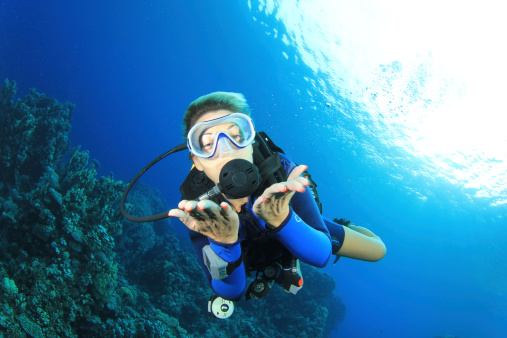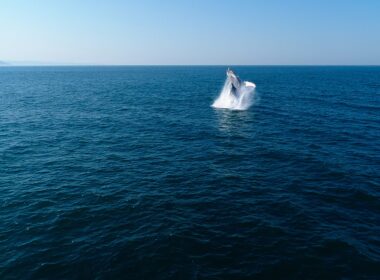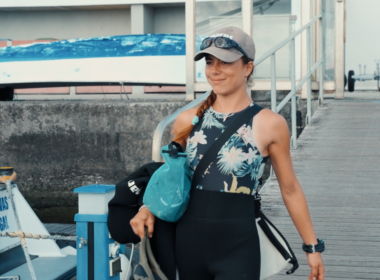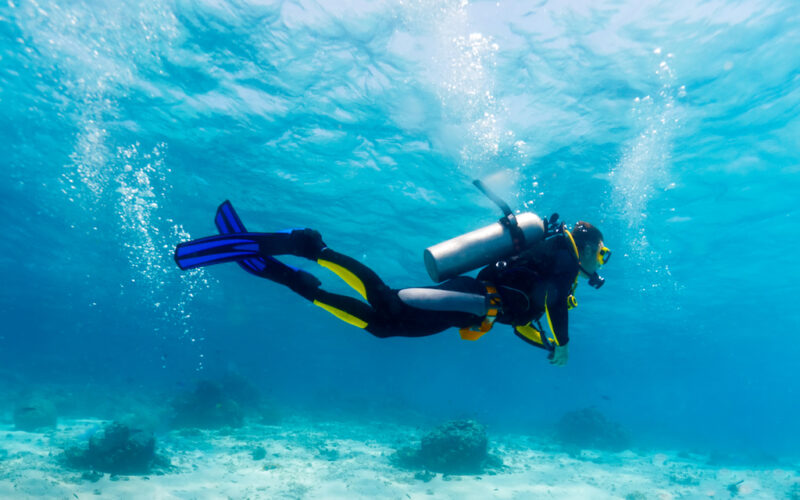Can you remember back to your first dive? If you did your confined water in a pool, you may have felt stable while kneeling next to your instructor and repeating the skills you were asked to do.
If you did your confined water training in the sea, you may have experienced water movement during your first skill sessions. You probably tried fighting the water to maintain your balance and current position. You were just getting used to the feeling of breathing under the water on “solid ground” when your instructor asked you to achieve neutral buoyancy, that’s when everything changed!
The mask skill may be the scariest for most, but the toughest skill to master is proper neutral buoyancy. True neutral buoyancy is without flapping arms or feet, tilting left or right, bopping off the ground or reaching the surface.
To complete the Open Water course, you would have had to have at least some level of skill with this exercise, but most of us are still not masters of our buoyancy upon completing the course.
Why is Good Buoyancy so Important?
Putting our safety aside for a moment, good buoyancy has lots of benefits. It ensures we know where we are on the reef and helps us to avoid touching the reef by accident, by not letting ourselves get closer than our current skill set allows. Corals often get broken by scuba divers bad buoyancy and although it is usually an accident, this can be avoided with additional training.
We are less likely to irritate our dive buddies by bumping into them, whether from below, above or with a fin kick, good buoyancy is usually combined with a good awareness of your position in the water.
Find out more about being an environmentally aware diver with the Green Fins Diver e Course. DiveAssure members get a discount, find it in your login area.

Safety Benefits
With the correct weighting and good control of our buoyancy, we should only need to adjust the air in our BC due to changes in depth and reduction in gas in our tank. This reduces our air consumption, as we are not wasting air going into the BC if not needed and with good buoyancy we will be more relaxed in the water and therefore consume less air.
Having good buoyancy is paramount to being an eco-friendly diver, if we are unaware of our location, we could end up knocking the corals which could break off bits of coral and cause damage, just a small piece could take years to recover. We also must be aware for our own sake as corals can be very sharp and can scrape, cut or sting us, which could cause a wound, injuries from corals can easily become infected. Discover here the dangers of untreated coral injuries.
Why Could Bad Buoyancy Become a Danger
If you are not fully aware of your buoyancy and are not competent at adjusting it throughout the dive, you could suddenly find yourself ascending uncontrollably towards the surface which could lead to a very stressful if not dangerous situation if not corrected fast enough.
Have you ever seen a diver kicking down as hard as they can while trying to dump the air out the back of their BC? This is probably the situation they were trying to avoid.
A too speedy ascent could cause decompression sickness, a lung embolism, or other barotraumas such as in the ears.
Going up isn’t always the problem, if you are not aware of your surroundings and have not adjusted your buoyancy correctly, you could continue to descend beyond your planned maximum depth. This could cause you to exceed your no-decompression limits and you may have to deal with an unplanned decompression stop, which can lead to complications if you haven’t got enough breathing gas remaining in your tank. It also causes frustration for your dive buddy as the dive will be cut short.
Buoyancy doesn’t just end underwater, ensuring you are positively buoyant at the surface, before and after a dive is just as important so that you can relax while either swimming back to shore, the boat or waiting to be picked up. Many drowning or near drowning incidents occur either because a diver did not inflate their BC sufficiently or because they forgot to dump their weight system after noticing the BC was not keeping them afloat.
When we panic as humans, we go into auto mode and are unlikely to listen to instructions, ideally, we need such good buoyancy control that it is second nature and is a response that we do not need to think about, ensuring that we react correctly even when stressed or panicked.
Your Dive Gear
Your dive gear plays an important role in your buoyancy and your buoyancy control.
Don’t forget that slight changes in your equipment, whether it be a new BC, new wetsuit or even new fins could have a dramatic impact on the amount of weights you need to use. If you have recently purchased new dive gear, head to your local dive center to do a buoyancy check or refresher dive to make sure you still feel confident.
Additionally, it is important to regularly maintain your dive gear to ensure you do not have any issues with your low-pressure inflator hose, inflate/deflate buttons or dump valves. A sticky inflate button could cause your BC to self-inflate underwater and a malfunctioning dump valve could mean you can’t dump air easily in your current position and will need to change your diving position to make sure you get the air out that you need.
We Recommend
It is important to keep your dive training regular. If you are not a regular diver, attend refresher dives before each diving trip to go over the most important skills with a diving professional. If you are unsure of your buoyancy or know you want to improve it, attend a buoyancy training course with a professional training center.
All divers should have their own comprehensive diving accident coverage. Even if you are a very confident diver who feels their skills are up to scratch, accidents can happen any time and you don’t want a dream diving vacation to end in horrendous medical bills. That’s where we come in. Get covered with DiveAssure today!






